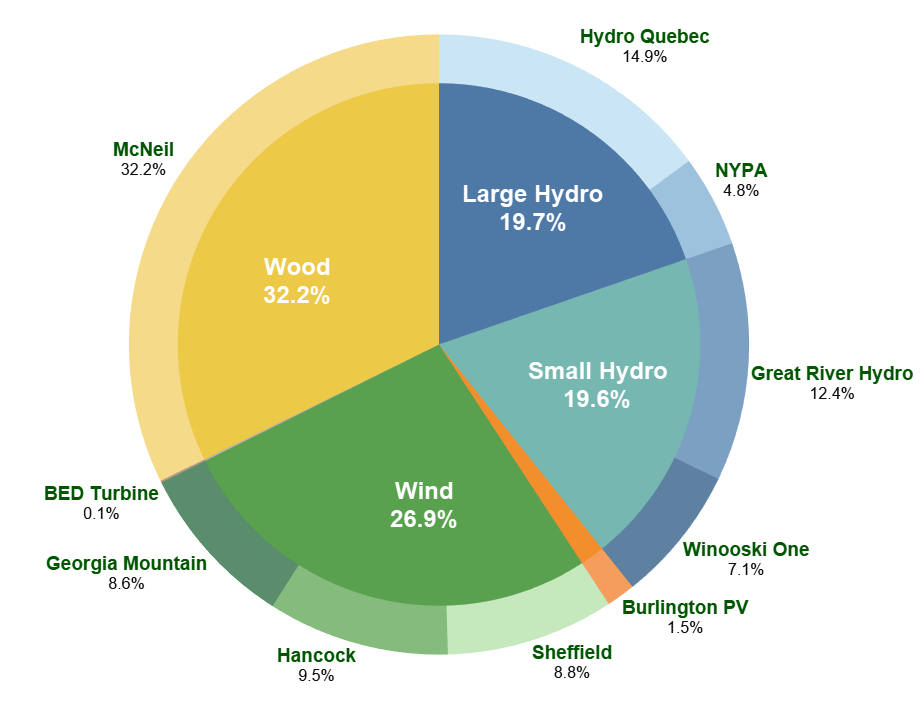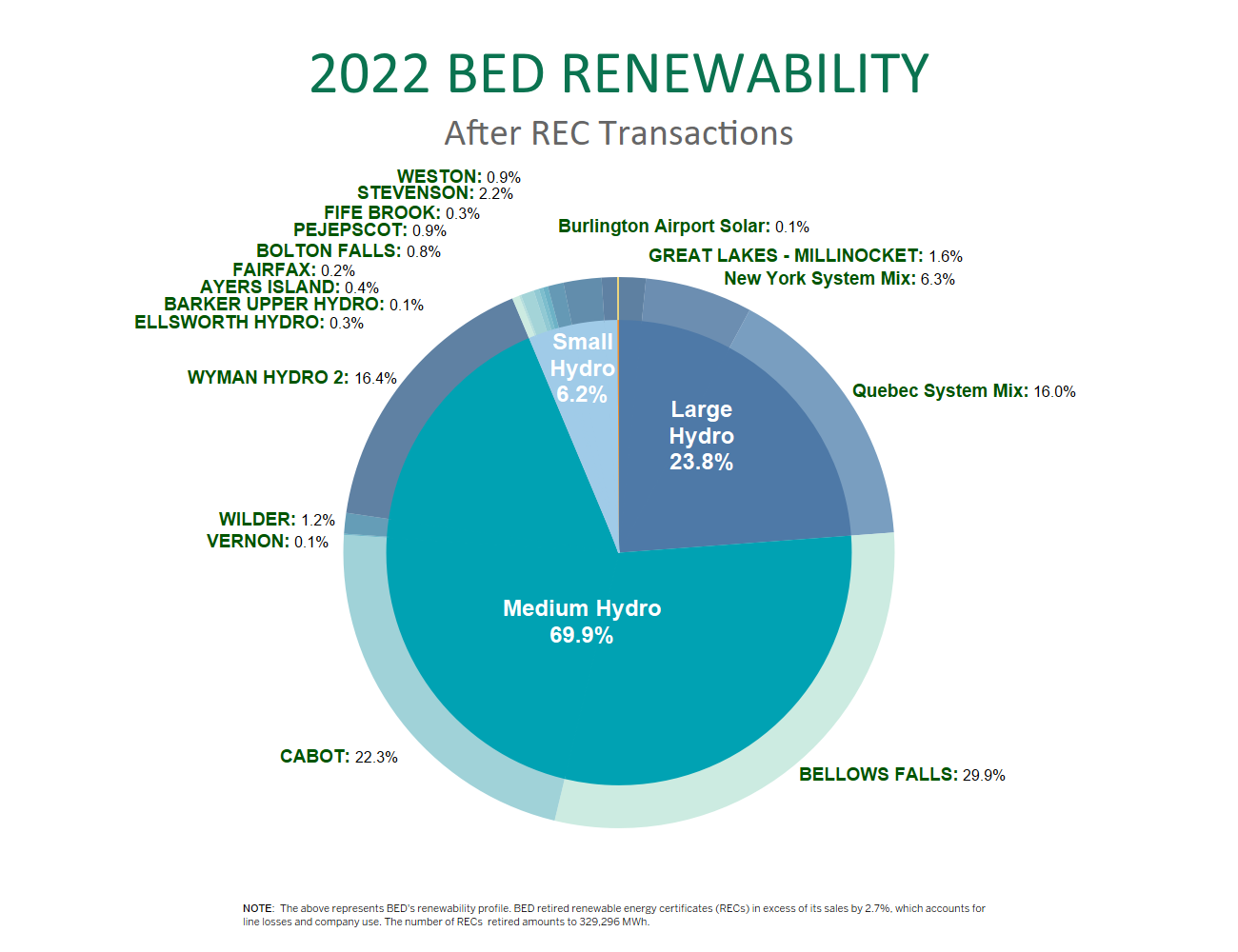Our Energy Portfolio
The table below shows the resources that provided BED’s energy supply in 2022.
BED Energy Supply, January-December 2022
| Winter Peak MW | 50.4 | ||||
| Summer Peak MW | 63.2 | ||||
| Energy Use (MWH) | 329,609 | ||||
| Resource | Fuel Type | Location | Capacity (MW) | Energy (MWH) | |
| McNeil | Wood | Vermont | 25.0 | 114,490 | 32.4% |
| Hancock | Wind | Maine | 13.5 | 33,227 | 9.4% |
| Sheffield | Wind | Vermont | 16.0 | 30,848 | 8.7% |
| Georgia Mountain Community | Wind | Vermont | 10.0 | 30,717 | 8.7% |
| Hydro-Québec | Large Hydro | Quebec | n/a | 52,558 | 14.9% |
| NYPA | Large Hydro | New York | 2.6 | 16,865 | 4.8% |
| Winooski One | Small Hydro | Vermont | 7.4 | 25,333 | 7.2% |
| Great River Hydro | Small Hydro | Vermont | n/a | 43,800 | 12.4% |
| Burlington | Solar | Vermont | 3.4 | 5,266 | 1.5% |
| BED Gas Turbine | Oil | Vermont | 22.0 | 357 | 0.1% |
| ISO New England Exchange – Net | Various (system mix) | New England | n/a | -23,855 | |
| Total Gross Generation & Purchases | 353,461 |
BED Fuel Types and Renewability
2022 Sources Prior to Renewable Attribute REC Sales and Purchases
BED sources the energy required to cover its annual sales plus an additional amount to account for electricity used by BED’s own facilities and the line losses incurred on the transmission and distribution systems (this accounts for an addition of approximately 3% above annual sales). Many generating resources are inherently variable, so the amount of production in any year will fluctuate. For CY2022, BED’s renewable resources provided over 100% of the total load served by BED. Because BED generated and purchased more renewable energy than was used by all of Burlington, there were no short-term energy purchases or net annual ISO-NE Exchange purchases in 2022. Excess energy was sold to the ISO-NE wholesale markets as non-renewable power (shown by the negative “ISO New England Exchange – Net” in the table above).
2022 BED Energy Supply
Prior to REC Transactions

NOTE: BED’s 2022 energy supply by source – The above chart represents energy purchased by BED prior to REC purchases and sales and amounts to 349,402 MWh of electricity. The chart does not represent an ability to claim those fuel types for renewability purposes – for more detailed information, see BED’s website. BED has no contracts for resources fueled by natural gas, nuclear or coal. 0.1 percent of generated energy comes from oil used at the BED Gas Turbine (in excess of BED’s energy needs). The sourced energy from renewables exceeded sales by 10 percent. Hydro is divided into large (>= 100 MW), medium (>= 30MW and < 100 MW), and small (< 30 MW).
After Accounting for Renewable Attribute REC Sales and Purchases
In order to verify that its energy portfolio is 100% renewable under Vermont’s Renewable Energy Standard (RES), each year BED must retire Renewable Energy Credits (RECs) equivalent to its annual sales from generators qualified by the State of Vermont. BED receives RECs for each MWh of renewable energy that BED generates or purchases under its contracts. Sales of RECs are allowed under BED’s integrated resource plan and help BED control the rate impacts of purchasing newer renewable resources (which are generally more expensive than older renewable resources or non-renewable alternatives). BED sells some of its higher-value RECs from its owned or contracted sources and purchases lower-value RECs from the renewable resource market for RES compliance purposes, and to maintain an energy portfolio that is 100 percent renewably sourced. In CY2022 BED sold RECs representing approximately 240,000 MWh of generation and received revenues of approximately $7.4 million – equal to over 17% of its cost of service. BED purchased and retired Vermont qualified RECs to replace the RECS sold. For 2022, BED reserved/retired 329,296 RECs from hydroelectric resources, approximately 8,500 RECs in excess of its 2022 sales of 320,783 MWh. BED voluntarily retires RECs in excess of its sales to customers in order to account for energy lost in the distribution and transmission of power to customers along with energy used by BED itself for its facilities and electric vehicle fleet.
2022 BED Renewability After REC Transactions

The following table represents the emission profile of the RECs that BED retired for 2022 as tracked by the New England Power Pool Generator Information System (note “-“ represents a zero value as for 2022 all RECs retired were from hydroelectric plants).
| Carbon Dioxide | Carbon Monoxide | Mercury | Nitrogen Oxide | Organic Compounds | Particulates | Particulates (<10 microns) | Sulphur Dioxides | |
|---|---|---|---|---|---|---|---|---|
| Renewability lbs. per MWh |
– | – | – | – | – | – | – | – |
